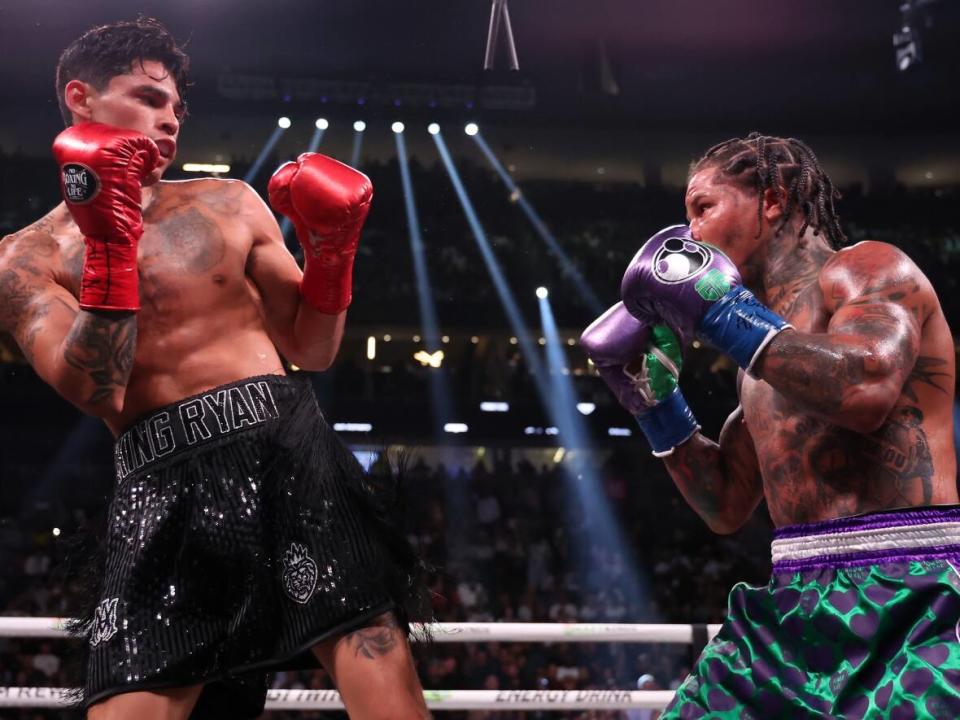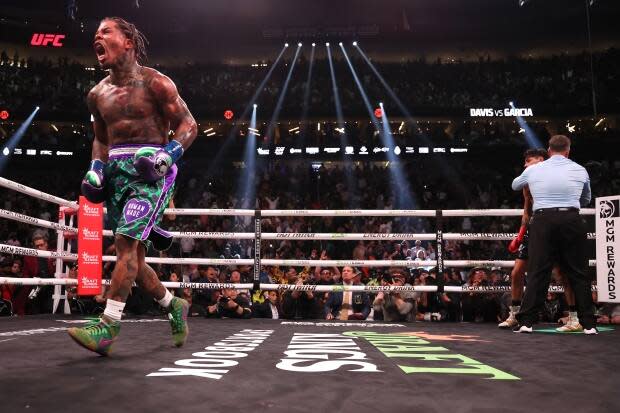Success of Davis-Garcia boxing fight adds momentum to dispute over control of sport

This is a column by Morgan Campbell, who writes opinion for CBC Sports. For more information about CBC's Opinion section, please see the FAQ.
Last Saturday night in Las Vegas, Gervonta "Tank" Davis dealt a bruising boxing lesson to Ryan "King Ry" Garcia, winning by seventh-round knockout in a high-profile matchup between previously undefeated young stars.
The pre-fight buzz portended a massive event. Davis and Garcia traded insults on every platform from FaceTime to Instagram Live, at the weigh-in, the day before the bout, and even promised to put up their guarantees in a side bet to set up a de-facto winner-take-all showdown.
And the hype campaign worked.
The bout spent the weekend trending on what's left of Twitter. According to early returns, the event generated 1.2 million pay-per-view buys. And while T-Mobile Arena's official capacity for boxing events is 20,000, organizers announced a crowd of 20,842, who paid a total of $22.8 million for tickets. By most measures, Davis-Garcia was the most significant in-ring competition between pugilists so far this year.
But is it the Biggest Fight in Boxing?
Probably not.
That honour probably goes to the brewing dispute between the International Boxing Association and World Boxing, with boxing's future as an Olympic sport at stake. Upstart World Boxing aims to become the recognized global federation overseeing the sport. The incumbent IBA, even though it has been suspended by the IOC, has filed a formal complaint with boxing's international integrity unit.
Spats like this are par for boxing's contentious, litigious course, but still troublesome for the sport and the Olympic Games.
This isn't a Boxing-is-Dead column. The buildup to, and turn out for, Davis-Garcia prove that, given great matchmaking and aggressive promotion, the sport can still thrive at the professional level.
The questions are these:
With feuding sanctioning bodies, are the Olympics positioned to tap into the sport's popularity?
And who loses if the Sweet Science disappears from the Olympics?
As much as Olympic gold medals can launch boxing careers, the IOC also benefits from the lifelong association with boxing legends whose names we all know.
George Foreman.
Ray Leonard.
Joe Frazier.
Muhammad Ali.
IBA vs. World Boxing
Dropping boxing severs a tie to all that rich history, but welcoming the IBA back under the current circumstances doesn't seem tenable either.
If we're framing it as a title bout, the IBA is a long-reigning but complacent champion based in Russia. Complaints about corruption piled up for years, and in 2019 the International Olympic Committee suspended the group, even though boxing remained on the Olympic program for the 2020 Tokyo Games.
Next summer's Olympic Games in Paris will feature a boxing tournament, but the sport is not guaranteed to appear after that.
Enter the challenger — World Boxing, a breakaway organization led by the United States and United Kingdom, which was formed earlier this month, and aims to secure boxing's long-term Olympic future, by becoming the IOC's recognized international sanctioning body.
"I can speak for the United States and many other national federations. We have a vested interest in maintaining a pathway to the Olympic movement," said Tyson Lee, head of USA Boxing and a World Boxing board member, to the Associated Press. "Somewhere along the line that turned out to not be a priority for IBA."

The IBA, naturally, is taking the challenge personally.
"The IBA strongly condemns the efforts of individuals to damage the significant strides taken by the IBA over the last few years to secure boxers the best future possible," said the IBA, in a statement issued to Reuters.
As I've mentioned in the past, I think gambling is a bad habit and a Faustian bargain of a business plan. But if I were a betting man, I wouldn't put money on boxing returning to the Olympics if the IBA wins this power struggle.
Repeated doping scandals already had the global sports community looking skeptically at Russian competitors. Russians were able to compete in Tokyo two summers ago, but only under the Authorized Neutral Athlete label. Factor in Russia's ongoing invasion of Ukraine, and it becomes even tougher to sell the rest of the world on the idea that a Russian-based sport organization will conduct fair competitions.
So to answer the question I posed earlier in the column, one clear loser emerges if boxing disappears from the Olympics in the long term.
The Olympic games themselves, deprived a sport that we know, if done right, generates TV ratings and social media engagement.
Granted, boxers aren't generally famous when they enter the Olympics. They build popularity with each win in the tournament and then, if they're successful and well-managed, use their Olympic acclaim as leverage when negotiating with pro promoters. Shakur Stevenson, a silver medallist in Rio in 2016, grossed $20,000 for his pro debut.
Most boxers make considerably less.
Olympics still a massive platform
In that sense, boxing differs from other Olympic sports.
Olympic track and field, for example, doesn't feature promising amateurs, who then join the pro circuit. The top pros and the top Olympians are the same people.
Boxing is more like Olympic basketball in the years before the Dream Team, or like NCAA hoops is today. It's not the only path to a lucrative pro career, but it's still a massive platform for a critical mass of future stars, whose professional success could, in turn, drive interest in the Olympic competition.
Of course, Olympic success doesn't vault any boxer to the top of the pro rankings, much less the list of high-profile fighters cashing eight-figure cheques. Indeed, the entire Davis-Garcia card featured two Olympic medallists, and neither headlined the event. Bektemir Melikuziev, a middleweight silver medallist in Rio, won his undercard bout. Yamaguchi Falcao, a light-heavyweight bronze medallist in London in 2012, was knocked unconscious in the first round by super-middleweight champion David Morrell Jr.
Among main event fighters, Garcia became a big-money performer by running up stats on Instagram (10 million followers by Sunday morning) and in the ring (23-0 before Davis starched him).
For his part, Davis became a bankable star by stringing together spectacular knockouts, and picking up endorsements from celebrities in boxing (Floyd Mayweather), mainstream sports (Odell Beckham Jr.) and hip hop (Drake).
But amateur accolades can still matter.
It's one thing to say you saw Robeisy Ramirez outbox Isaac Dogboe for a pro world title on TSN or ESPN, but something else you say you saw him outduel Stevenson in Rio, before either turned pro.
You know who would love that type of look into pro boxing's crystal ball?
People in the 1.2 million households and venues that purchased Davis-Garcia.
Not all of them, obviously, but enough of them to make Olympic boxing worth preserving.

 Yahoo Sports
Yahoo Sports 
